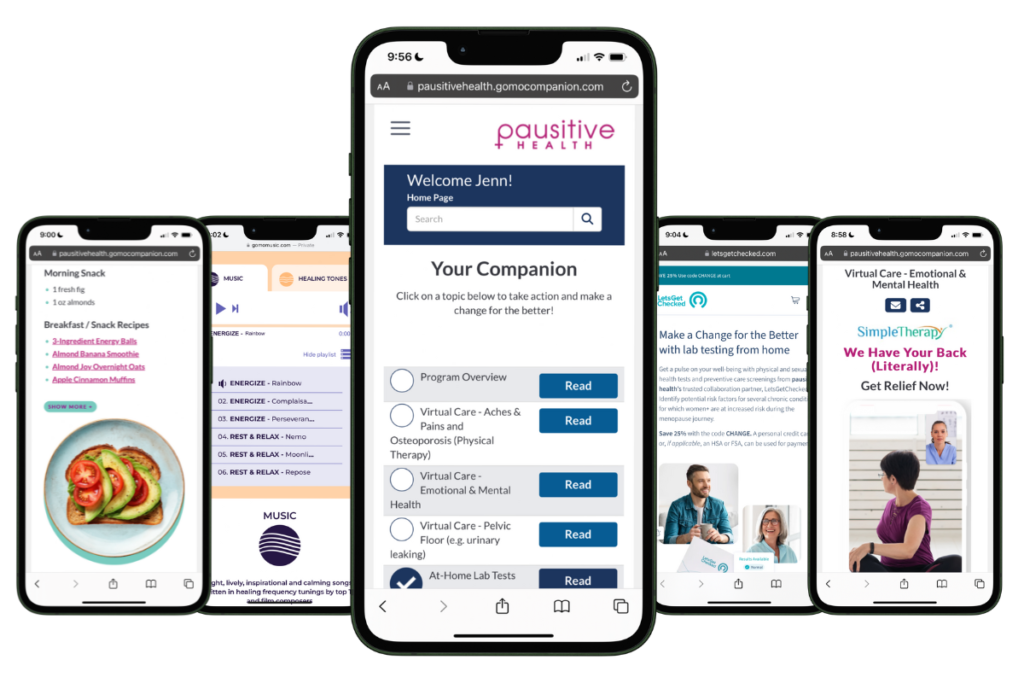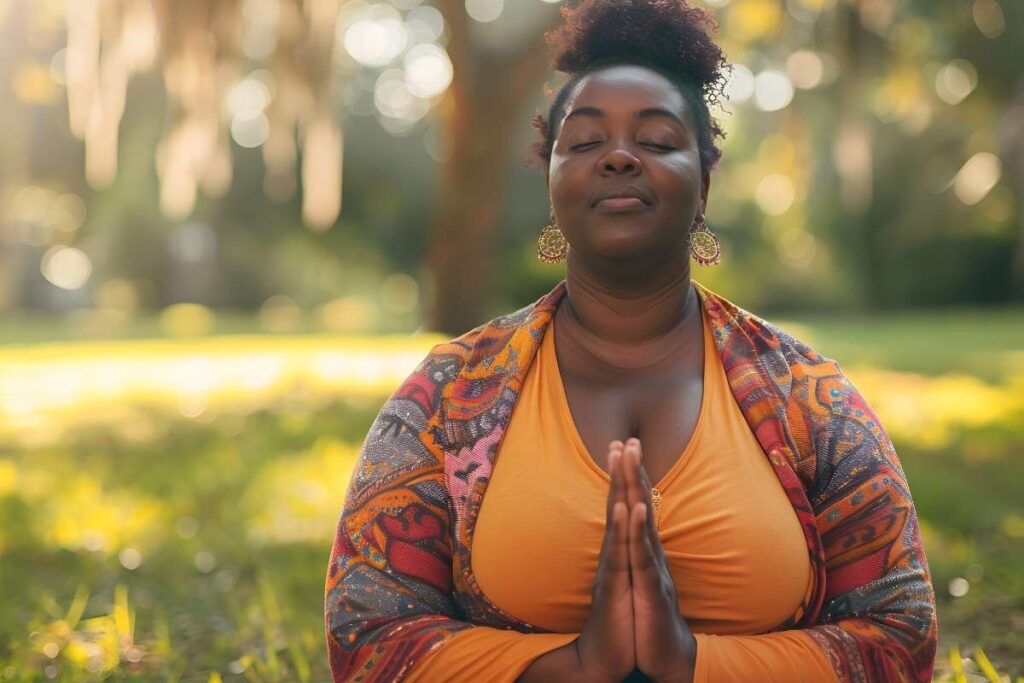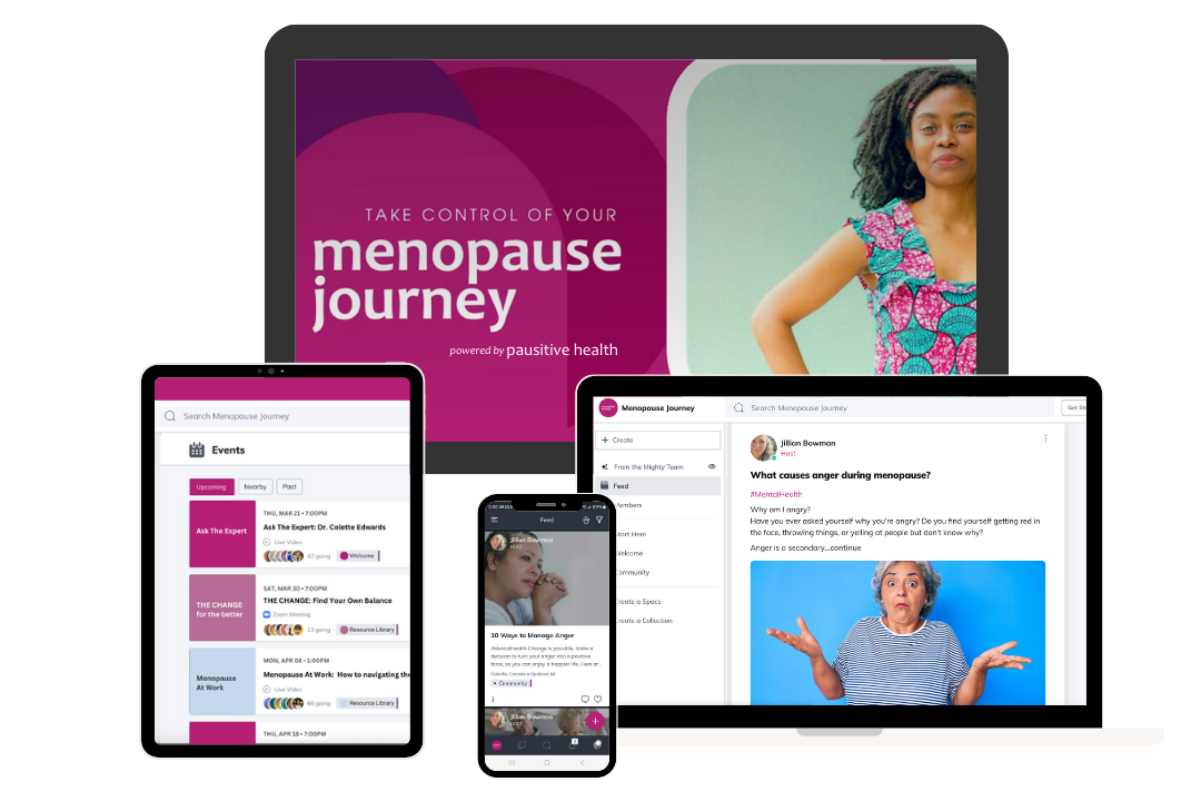Do you ever wish you could turn back the clock and hit “pause” on menopausal symptoms? If you’re missing your life before the hot flashes, palpitations, weight gain, mood swings, and dozens of other menopausal symptoms, you have company! You may feel a sense of loss and even grief over “how I used to be.” You may feel this way even if your physical and emotional symptoms are mild. Recognizing and accepting these emotions is the first step to managing feelings of grief and loss. Try these coping strategies to manage your emotions during the menopause journey.
What is grief?
Grief is a universal human experience. It’s a natural emotional response to change or loss.
You may feel grief from any number of life events. It’s not always the loss of someone you love. It can be the loss of a job, a relationship, a longstanding dream, or a significant life transition. That includes the menopause journey. In fact, the associated hormonal changes can amplify a sense of loss or grief.
Allow yourself the space to grieve!
“It includes any change – whenever there’s a significant life change, something that we hold dear, or something that we care about that is taken away. Usually, it’s not by choice. It’s some external factor. Some part of our daily lives has changed,” explained Denise Shields, PhD.
She’s a grief coach and international mindfulness teacher who provided insights to women+ on the menopause journey during a pausitive health webinar.

How do you know you’re experiencing grief?
Grief after you lose someone is usually obvious because you feel sadness. And there’s a physical being whom you lost.
But grief during menopause may be less apparent because you’re feeling the loss of the person you were before you began the menopause journey, and your emotional response may be different.
Here are some of the emotional, physical, and behavioral responses to look for:
- Emotional: Sadness, anger, guilt, frustration, fear, and loneliness.
- Physical: Fatigue, changes in appetite, aches and pains, weight fluctuations, less energy, and insomnia.
- Behavioral: Difficulty concentrating, irritability, and withdrawal from social interactions.
Recognizing these symptoms is a vital first step in managing grief, but it may not be easy to put your finger on it because many of these grief symptoms can be similar to those related to the hormonal transition of menopause.
The menopause-grief connection
If grief is the emotional response to loss or change, think about all the changes to your mind, body, and spirit during the menopause journey.
Menopause itself is a hormonal transition into a new and unavoidable but normal stage of life.
Menopausal changes can impact you from head to toe, and while managing the symptoms, you may also be dealing with other life changes like shifting family dynamics, helping aging parents as a caregiver, career changes, divorce, or health challenges. You may also lose close friends and family, which adds another layer of grief to this time in your life.
In addition to life changes, during the menopause journey, you may grieve the loss of:
- Health and well-being
- Identity
- Fertility
- Energy
- Body changes
Everyone’s menopause journey is unique. Everyone’s grief is unique too. Nobody experiences it the same way.
By recognizing and accepting these emotions without judgment, you can lighten your emotional load and take the first step toward a better you on this journey!
If you need help, join our membership program and connect with a community of women+ ready to help you make a change for the better!

Free Support
For A Limited Time!
pausitive health offers personalized support for every stage of the menopause journey. Customize your experience with 14 evidence-based educational tracks, a diet assessment with recommendations and a food library, solutions for aches and pains, virtual care options, practical lifestyle supports, and a supportive community. All in one trusted place.
Join the pilot and be the first to know when our web-app is coming in 2026!
Coping strategies for menopausal grief
So, how do you manage these feelings of loss and grief, so they don’t consume you when you have so many other things on your plate?
We asked Dr. Shields to provide insights during the pausitive health webinar. Like most of us, she’s lived through grief and loss in life and the changes that come with aging and the menopause journey. She discussed some strategies to manage these feelings.
“Grief is an area that is near and dear to my heart. I know it’s a universal experience and so much can be gained from applying what we know from mindfulness and self-care to support women through this time,” explained Dr. Shields.
You can watch the webinar or keep reading about these coping strategies.
These coping mechanisms can help you with the feelings of loss or grief that come with change, and they also can help you manage the emotional (and physical) symptoms of menopause.

1. Practice mindfulness and be present with your emotions.
You can’t ignore grief, although many people try. It won’t go away!
“The pain of grief comes from the emotions that are underlying it which are often sadness, anger, or fear. The emotions are there and when we try to push them down, it doesn’t go away. It just takes that much longer for us to be able to move through it and heal,” Dr. Shields explained.
Healing requires recognition of your emotions. Acknowledge all of them, and accept them without judgment.
To do that, Dr. Shields recommends the RAIN mindfulness technique.
- Recognize the emotion.
- Allow it to be present without judgment.
- Inquire into the cause with curiosity.
- Nurture yourself with compassion and care.
Just want the script for this mindfulness technique? During the webinar, Dr. Shields spent ten minutes walking women+ through this technique. Get it here.
Recognize and name your emotions.
As Dr. Shields says, “name them to tame them!” Say the emotion out loud to yourself to help yourself work through it and accept it.
For example, saying, “I feel sadness,” can help you process and organize your feelings instead of suppressing them.
Allow them to be present
Once you acknowledge your emotions, accept each one without judgment. Allow yourself space to cry, be frustrated, or feel sorrow. Don’t judge yourself for how you feel.
You don’t have to be “strong” in the face of grief and loss. You’re human, and you have emotions. Accept them and show your authentic feelings.
“Crying does not mean that we’re weak. That’s a natural response we come to embrace when we have a different way of thinking about it. It’s recognizing that you know when you are authentic, and we take the time to not only allow our feelings but show these to loved ones and friends. That authenticity helps others recognize that they can be human too. Putting on the brave front is not a healthy one,” Dr. Shields said.
If it’s difficult to allow yourself to cry, remember that it’s a natural and healthy response. These emotions are like signals to the body, telling you there’s something to pay attention to and work through. Letting out these emotions allows you to create space for healing.
Inquire about your feelings.
Be curious and ask yourself why you feel the way you do. Do this with each emotion you recognized and named in the previous step.
Now, ask yourself why you’re feeling this way? Did something (maybe a symptom) trigger it? Or did something at work or at home trigger it?
Knowing your triggers can help you manage the emotional response.
Nurture yourself with self-compassion.
Be kind to yourself – as kind as you would be to someone else! Use compassionate self-talk to soothe emotional pain.
For example, say, “This is hard, and I’m here for myself” or “This is hard, but it’s ok.”
- Incorporate gentle physical touches like placing a hand over your heart to comfort yourself.
- Start a gratitude practice by writing down three things – big or small – that you’re grateful for.
- Reflect on the positive memories or experiences that bring warmth and meaning to your life.
Want the mindfulness RAIN script Dr. Shields used during the webinar. Read it or listen to it.
Practice this daily as your emotions may change
You may have to return to this step throughout your journey because your emotions will likely change over time. At first, you may feel shock or disbelief about the ways your body is changing. Later, you may be angry!
It’s the same when you lose a loved one. The initial reaction is often a surreal feeling. Then, a sense of emptiness or loneliness. You may feel guilt or anger. And, eventually, you may feel fear.
Fear can be part of the menopause journey, too – fear of what’s coming next. Especially if you’re dealing with many symptoms or new health conditions as a result of the hormonal changes.
There are stages to a grief journey, just like there are stages to your menopause journey. As you progress through those stages, come back to this step.
And remember your grief may be different than your friend’s. And some women+ may not experience it. That’s ok. It’s like menopause. No two journeys are alike.

2. Reconnect with your body.
In addition to a mindfulness practice, you can manage your emotions over these changes by reconnecting with your body. Focus on the present moment and make it a mindful one.
Prioritize exercise, sleep, healthy eating, or a mindfulness technique like the one above.
- Exercise can do wonders for you! It can be even better if you’re out in nature doing something as simple as taking a brisk walk. Start small and then try to make exercise a regular activity. Try yoga or swimming to boost mood and energy levels.
- Prioritize sleep. Develop a calming bedtime routine and avoid screens before bed. While we understand sleep can be elusive during the menopause journey, there are steps you can take to improve your Zzzzs.
- Nourish your body with balanced, nutrient-rich foods that you need during the menopausal journey to support emotional and physical health.
- Recognize the ways grief can impact your body. Sadness can feel like a heaviness in your chest or heart area. It can slump your shoulders, or you may feel tired or down.
- Find YOU time. Self-care is critical during the menopause journey. Try these self-care strategies, use deep breathing, or just spend a mindful moment focusing on the present and accepting it for what it is without judgment.
- Gain a new appreciation for menopause and the ways symptoms can impact your body through empowering programs like pausitive health. Allow yourself the time each day to invest in the power of YOU!

3. Find creative outlets
When was the last time you tapped into your creative side? Artistic outlets can help you release your feelings and channel them into a positive force in your life. And you don’t need to be Picasso! Each of us is an artist in our own way.
- Express your emotions through art, music, or dance. These are great non-hormonal approaches to improving symptoms on the menopause journey.
- Explore hobbies that bring you joy.
- Writing or journaling about your grief can help you uncover and face your feelings and foster a sense of relief and clarity.
4. Accept your “new normal” and fuel it with passion and purpose
Finding your “new normal” during the menopause journey involves redefining what life looks like for you now, in the present moment. This process takes time and requires being patient with yourself.
“Unless we can allow that grief of what was… we can’t make space for what may be next,” Dr. Shields explained. “By processing grief, you create room for new opportunities, passions, and purpose.”
During a podcast with Peli Health, Dr. Z. Colette Edwards, Founder and Chief Medical Officer of pausitive health, spoke about the grief and mourning women may feel during this stage of life. She talks about letting go and focusing on YOU!
The menopause journey is an opportunity for reinvention. In some cultures, the word for menopause even means transformation and renewal!
“It’s about paying attention to where we’re going to put our energy next,” Dr. Shields said.
Here are some ways to accept your new normal.
- Accept that grief isn’t linear. Don’t expect that you’ll “just get over it and put it behind you.” Some people cycle through the 5 stages – denial, anger, bargaining, depression, and acceptance – as constructed by David Keesler and Elisabeth Kübler-Ross. But others may move out of this order and take a lot of detours.
- Set small, achievable goals to rebuild routine and reignite purpose in your life.
- Use this transitional phase of life to explore new interests or revisit past passions.
- Embrace the opportunity to redefine your identity and pursue activities that are meaningful to you now.

5. Seek connection and support
Many people feel lonely on their grief journey. But, it’s not meant to be that way.
Dr. Shields reminded attendees of the pausitive health webinar that,
“Grieving is not meant to be something that we just hold up and deal with ourselves. Sharing your experiences with friends, family, or a support group can provide a sense of community and validation.”
Here are some ways to get started:
- Connect with loved ones or join menopause-specific communities for shared experiences like the menopause.journey community moderated by pausitive health.
- Explore professional medical support from therapists or grief counselors if grief feels overwhelming.
- Consider support groups, both local and online, to help normalize and validate your feelings and heal over time.

Join the community!
LEARN • SHARE • LAUGH • BOND
The menopause journey community is a private online community powered by pausitive health. It’s a safe space for women+ to connect, learn, share, laugh, and bond through their menopause journey.
It’s free to join! We hope to see you there.
Grief vs depression
Grief is a process, not a permanent state. By allowing yourself to experience grief fully, you create space for healing and growth.
If you’re grieving, it’s important to distinguish this feeling from depression, for which menopausal women+ are at increased risk during the journey.
Grief and depression can be confused because of an overlap of signs and symptoms, but they differ significantly.
- Grief is a natural response to loss. Though people may have similar feelings as those who are depressed, they are more likely to stay connected to others and also experience pleasure and moments of happiness, if only when reliving positive memories that bring joy or a smile to the face. It is also more likely to be tied to a specific loss.
- Depression is typically more pervasive, may not have a specific triggering event, may be more likely to impact daily functioning and connection with others, and the associated feelings may be relentless without treatment.
If grief begins to feel unmanageable or transitions into prolonged sadness and complicated grief, seeking professional support is essential.
Call 9-8-8
Reclaiming your strength and purpose
Both grief and the menopause journey can be transformative experiences. Together, they challenge you to adapt, grow, and reexamine your life and how you want to proceed going forward.
We understand the menopause journey can be challenging. That’s why we created a pausitive health membership program as a one-stop solution to address its many symptoms.
And, that’s why the name has “pausitive” in it – because we truly believe women+ can be “positive” on this journey. It’s an opportunity to reconnect with yourself, discover new passions, and find meaning in the present moment and the life chapters that lie ahead.
Remember, coping with grief is a process, not a destination. It may also be with you and pop up at unexpected moments out of the blue.
Be patient and compassionate with yourself as you navigate this journey. With time, support, and self-care, you can emerge stronger and more resilient.
Remember, what Dr. Shields said,
“Grief is a universal experience. The more we can accept and learn how to navigate the change and emotions associated with it, the more content we’ll be in the long run.”
Prigerson HG, Shear MK, Reynolds CF. Prolonged Grief Disorder Diagnostic Criteria—Helping Those With Maladaptive Grief Responses. JAMA Psychiatry. 2022;79(4):277–278. doi:10.1001/jamapsychiatry.2021.4201
You may also like...

Power Through Menopausal Changes with this RAIN Mindfulness Technique
The RAIN mindfulness technique can help you power through menopausal changes with a positive mindset. Read or listen to this script.

19 Menopause Self-Care Ideas To De-Stress and Improve Symptoms
Menopause self-care can de-stress you and improve symptoms. Take time for you! Learn 19 self-care ideas.

Yoga For Lifelong Strength: 5 Yoga Types To Power Through Daily Life
Yoga can provide lifelong strength. Learn about 5 yoga types and the benefits so you can power through daily life.

